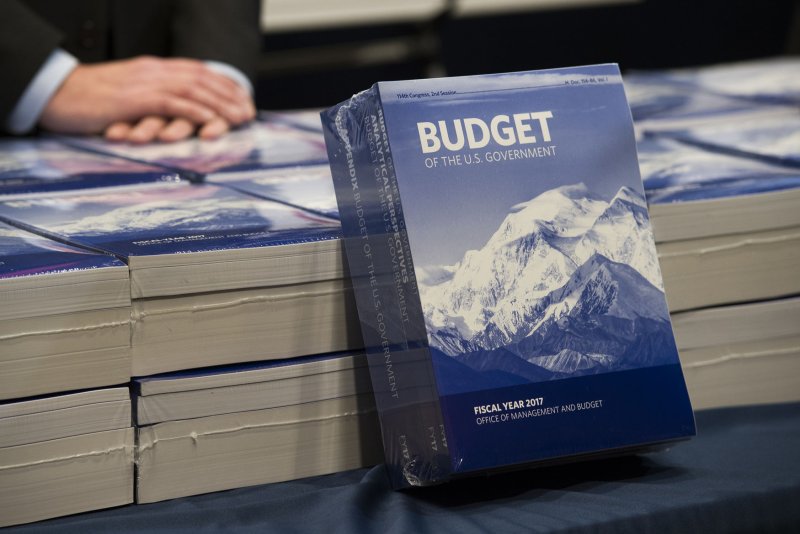1 of 2 | Copies of President Barack Obama's fiscal 2017 budget proposal are displayed for members to pick up, in the Senate Budget Committee room at the Capitol on Tuesday. Photo by Molly Riley/UPI |
License Photo
WASHINGTON, Feb. 9 (UPI) -- President Barack Obama on Tuesday sent his $4 trillion final budget proposal to a Republican-led Congress, which has guaranteed many of his proposals would be rejected.
Obama's eighth and last budget proposal includes a $1 billion "Moonshot" task force to fight cancer, $1.8 billion in emergency funding to combat the Zika virus in the United States and abroad and a $10-a-barrel oil tax to be used for infrastructure renovation and clean transportation projects.
Rep. Steve Scalise, R-La., said the oil tax proposal showed Obama has "waged open warfare on American energy," adding that the "House will kill this absurd proposal."
Democratic Minority Whip Steny Hoyer lauded the 2017 spending plan as a responsible vision for the next generation -- and defended the oil tax as highlighting the need for energy-efficient transportation infrastructure, which the levy would help fund.
Other proposals include increased funding for military projects such as $7.5 billion to be used to escalate the fight against the Islamic State and $1.1 billion to combat the abuse of prescription opioids and heroin amid a nationwide addiction crisis.
The plan also includes $12 billion over 10 years to expand food benefits to impoverished children during the summer, when they do not receive school meals, as well as financial incentives for states that have not expanded Medicaid programs to cover more uninsured workers.
Republican chairmen of the House and Senate budget committees said Obama's budget director, Shaun Donovan, will not be invited to testify about the budget -- breaking a 41-year-old tradition.
The move was criticized by 14 Democrats on the House Budget Committee, who signed a letter calling it "disrespectful to the committee members, the public and the president."
"One of the problems with their hardliners is they don't want to listen to anybody," Hoyer, D-Md., said at briefing. "They're not interested in hearing why the budget is as it is because they have their own preconceived ideas and therefore have no intention of considering it."
Douglas Holtz-Eakin, an economic adviser to Republicans and a former director of the Congressional Budget Office, told The New York Times the tradition allowing the administration to explain its budgetary intent "should have been maintained," which would give an opportunity to both sides to "express why you disagree."
Sen. Susan Collins, R-Maine, said the budget chairmen's snub may have been a reaction to the president's lack of communication on devising the budget proposal.
"The budget suggests to be that the president has no interest in trying to force a bipartisan approach," Collins said.
In 2009, Obama's first year as president, the United States ran its first annual deficit of more than $1 trillion as it was entrenched in a debilitating recession, with unemployment reaching 10 percent. Since then, annual deficits have been cut by three-quarters to 2.5 percent of gross domestic product, attributed in part to bipartisan spending caps, economic recovery and the end of some tax cuts brought under former President George W. Bush. The unemployment rate has been reduced to 4.9 percent.
Obama's plan attempts to narrowing the deficit, proposing nearly $3 trillion in deficit reduction over the next decade, said Joel Friedman, vice president for fiscal policy at the Center on Budget and Policy Priorities. In making compromises between deficit reduction and economic investments — such as the president's $300 billion-plus allocation to infrastructure — Friedman said the president "struck the right balance."
The projected gap between spending and revenues in the 2017 plan is about $500 billion.
Julia Jacobs of Medill News Service contributed to this report.















